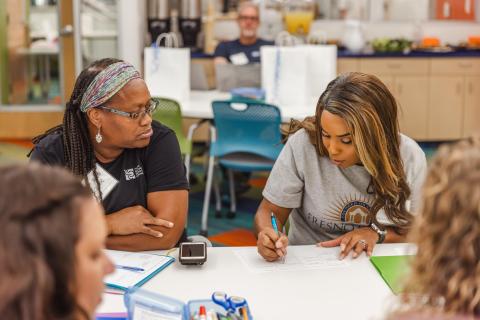Facilitator Resources
Building The Capacity Of Educators
Suites of resources on a range of early STEAM topics for facilitators and coaches to use in professional learning with educators.
You reflected on your experiences as a coachee at the beginning of this module. Now, let’s reflect on your experiences as a coach.
Think of a time when you helped someone gain new knowledge, learn a new skill, or expand their mindset. Take a moment to reflect and journal about your coaching experience.
Reflect:
Think of a time when you helped someone learn a new skill.

In these videos, two coaches reflect on their experiences providing early math coaching for teachers and family child care (FCC) providers. Notice how they:
Reflect:
Consider your role as an early math coach. What are some of your current areas of strength? What are some areas you would like to grow in?
Coaching is a partnership. Coaches and coachees listen to each other and work together to meet a common goal. Coaching is most effective when coaches build good rapport—or friendly, trusting relationships—with their coachees. Rapport can enhance coachees’ motivation, confidence, engagement, and willingness to change (Hull et al., 2009).
Observe this video of coach Millie sharing how she builds positive relationships with her coachees. Notice how she uses a strengths-based approach to collaborate with coachees and support their teaching practice.
Clear communication and a shared understanding of educators’ goals and values can lead to a coaching plan that best meets the educators’ needs. Let’s explore some relationship-building strategies.
Take time at the beginning or end of coaching conversations to get to know coachees personally. The more you learn about the coachee, their lived experiences, and their learning environment, the better you can support them to achieve their goals.
Use this Initial Coaching Conversation Template during your first meeting with your coachee to learn about them and their goals.
As a coach, you want educators to know that your role is to support them, not to evaluate them. Notice and recognize educators’ strengths. You might share what you noticed by leaving a note or sending a follow-up message.
Educators bring a wide range of life experiences to their work. To engage in culturally responsive coaching, recognize each coachee’s unique perspectives, beliefs, priorities, and expectations. Practice curiosity and avoid making judgments. Provide opportunities for coachees to share different ways of thinking and learning.
For additional resources on relationship building and culturally responsive coaching, visit the following links:
Your coaching supports will depend on a coachee’s skills, needs, and preferences. Provide opportunities for coachees to share feedback about what strategies might work (or might not work) for them. Be mindful of each coachee’s individual needs. For example, provide accommodations for individuals with disabilities or schedule meetings at times and locations that are convenient for them.
Reflect:
What is one strategy you might use to build rapport with coachees?
The word “math” might bring up a variety of emotions, such as excitement, confusion, or anxiety. Coaching can be an effective way to support educators in uncovering their feelings and thoughts about math. In addition, coachees can better understand how adults’ math mindsets might impact the children they serve and care for.
As an early math coach, you may have experienced or witnessed implicit biases and stereotypes about math and early math learning. You might explore the Mindsets About Math self-study module to reflect on your own math mindset and consider how your experiences might impact your work.
After reflecting on your math mindset, consider reviewing the Math Mindsets Matter suite of resources for strategies on how to support others to develop positive math mindsets.
As an early math coach, you need a strong understanding of how young children develop and learn early math knowledge and skills. You should also be able to identify and apply effective early math teaching practices.
To build your knowledge and skills related to children’s early math learning, visit the following Facilitator Resources. Each suite of resources offers slide decks, activities, handouts, and other resources that you can use for your own learning and in coaching sessions with educators.
You may also want to refresh your understanding of effective early math teaching practices. Visit the M5 Early Math Approach suite of resources for ideas and strategies for promoting math-rich learning environments and meaningful investigations that are responsive to individual learners’ interests, strengths, and needs.
Many factors—such as time, resources, staffing, and budget—may impact how coaching is implemented.
You may have many responsibilities, such as:
Co-developing a coaching plan is a helpful way to get started. Then, a coach adjusts and adapts the plan based on a coachee’s evolving goals and needs.
Coaching is an ongoing collaboration between a coach and coachee. A coaching plan is likely to change over time. A flexible plan can help a coach balance their responsibilities and support a coachee to the best of their ability.
Modules for leaders, professional learning facilitators, and coaches to build their knowledge and skills in how to provide early STEAM professional learning.
Suites of resources on a range of early STEAM topics for facilitators and coaches to use in professional learning with educators.
Copy the link below to share this resource with students, families and colleagues, or to save for later.